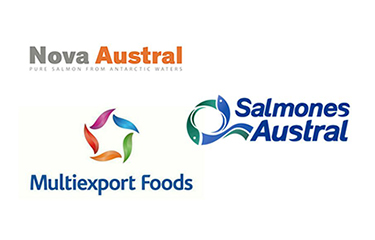Three of Chile’s largest seafood farming operators have posted their third-quarter results for 2020.
During the third quarter, Chilean salmon farming company Nova Austral’s revenues increased 26 percent to USD 39.7 million (EUR 32.8 million) when compared to the same period in 2019, mainly due to higher volumes sold and partially offset by lower market prices, the company reported to the Oslo stock market, where it is traded publicly.
However, cost of goods sold outpaced the revenue increase, increasing by 32 percent year-over-year to USD 37.3 million (EUR 30.8 million), which the company attributed to higher volumes sold (3,000-plus tons versus Q3 2019).
The company's other income spiraled 104 percent to USD 300,000 (EUR 250,000), versus USD 6.8 million (EUR 5.6 million) in Q3 2019, “since no harvest took place during Q3 2020 and therefore no Navarino benefit was accrued,” Nova Austral said. Meanwhile, distribution costs surged 60 percent to USD 3 million (EUR 2.5 million), driven by higher volumes sold, refrigerated storage costs, and higher logistics costs due to an increase in sales of fresh products.
Regarding Salmones Porvenir – the joint venture formed in February between Nova Austral and fellow farmer Trusal, a subsidiary of Salmones Austral, at the Skyring Sound – Nova Austral said that the ISA virus outbreak in July at two of its 16 cages at the Navarro 3 center led to an early harvest of the site, while stocking of Navarro 2 was ordered postponed by the national fishing service Sernapesca to December 2020, due to the proximity (less than 10 kilometers) with Navarro 3. The last site of the JV, Isla Juan, is slated be stocked in March 2021 as planned, and no further cases of ISA have been reported in the Skyring area to date.
The company added that total stocking in 2020 is expected to approach 4.9 million smolts, with harvest volume of around 16,000 tons – lower than in previous years due to stocking volume restrictions in 2019. For 2021, stocking is expected to be in the range of 6.7 million to 7.7 million smolts, including two sites of the JV and two leased to Australis, all of them in Skyring Sound.
Nova Austral is owned by the equity funds Altor Fund III and Bain Capital. Its entire operations are in the Magallanes and Antarctic regions, employing some 800 people directly. It has been in regulatory hot water for falsifying mortality reports last year at centers in the Magallanes region.
Salmones Austral
Los Ángeles, Bio Bio, Chile-based Salmones Austral saw revenues dip 14 percent to USD 45.8 million (EUR 37.8 million) in Q3 2020, compared to USD 53.2 million (EUR 43.9 million) the previous year. Cost of goods sold outstripped revenues, increasing 35 percent year-over-year to USD 55 million (EUR 45.4 million), according to results the company posted on its website.
The aforementioned led to a net loss of USD 17.4 million (EUR 14.4 million) in Q3, compared to a net profit of USD 11.9 million (EUR 9.8 million) in the same quarter one year before.
“Although the price crisis in the industry, as a consequence of the pandemic, has been deeper and longer than was estimated at the beginning of the year, we have taken advantage of this situation to diversify our markets and sales channels. As such, the volume of Atlantic salmon sold through September is 25 percent higher than that sold in the same period in 2019,” Salmones Austral Vice President Christian Samsing said.
Samsing said the company has continued with its strategic plan, including the construction of a new USD 36 million (EUR 29.7 million) recirculating aquaculture system (RAS) farm as well as the opening of new farming centers in the Magallanes region.
Salmones Austral was created in 2013 after the merger of Trusal and Pacific Star. Today, it has annual production of some 45,000 to 50,000 MT, exported to more than 20 countries, with more than 1,200 workers operating in two process plants and 20 freshwater and seawater farming centers in the regions of Maule, Biobío, La Araucanía, Los Lagos, and Aysén.
Multiexport
Similar to Salmones Austral, Puerto Montt, Chile-based Multiexport Foods also saw negative gross margins in the third quarter, posting a loss of USD 12.2 million (EUR 10.1 million) as costs of goods sold at USD 118 million (EUR 97.4 million) were higher than revenues of USD 106 million (EUR 87.5 million). The company's revenue fell 21 percent from Q3 2019 revenue of USD 134 million (EUR 110 million).
The company attributed the lower revenues to a drop in prices in a market affected by the COVID-19 pandemic, particularly in the hotel, restaurant, and cafeteria (HoReCa) segment.
“The reference price averaged 3.87 USD [EUR 3.18] per pound in the quarter, dropping 21.5 percent compared to Q3 2019 and 4 percent compared to the previous quarter,” Multiexport announced in a statement posted on its website. It highlighted volume sold of 22,040 tons WFE, increasing 2.7 percent compared to Q3 2019, while total harvest volume reached 25,055 tons WFE, up 2.0 percent year-on-year.
Net losses for the quarter sank to USD 40.7 million (EUR 33.6 million), compared to a net profit of USD 5.8 million (EUR 4.8 million) in the third quarter last year, with fair value adjustments showing a loss of USD 32.7 million (EUR 27 million).
Founded in 1987, Multiexport Foods has more than 2,400 employees and handles over 100,000 tons of salmon a year, with productive activities in southern Chile’s regions IX, X, XI, and XII. It is present throughout the salmon production chain, from reproduction to distribution to the final customer in more than 30 countries. It has recently been going through management changes.







